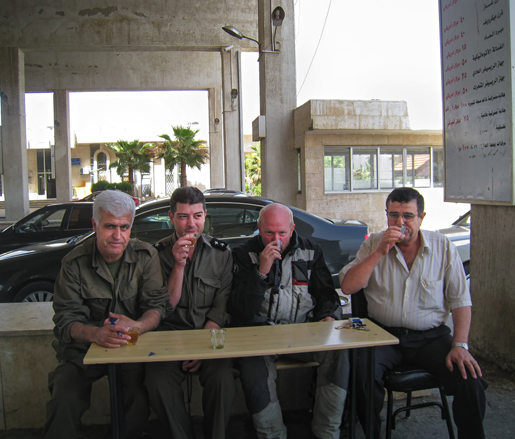Allan Karl’s three-year tour of five continents led to some delicious discoveries

In 2005 Allan Karl began a solo journey around the world by motorcycle. He left behind a successful career in marketing, sold nearly everything he owned (including a wine collection rich in Screaming Eagles, Shaffers, and Harlans), and packed what remained in twin panniers affixed to his bike. As he planned the trip, friends and family tried to dissuade him, fearing for his safety, but he persisted with a smile.
“It’s my nature to be open and curious and happy to meet people, and I worked from the perspective of a goodwill ambassador,” says Karl. “I believed then, and I still believe, that the world is a safe place, full of curious people, open to learning and sharing with each other.”
He left Newport, California, on Independence Day, and came home three years later, having traversed 35 countries on five continents, covering 62,000 miles in total. Drawing on his extensive notes and photographs, with plenty of help from the network of taxi drivers, cooks, hotel clerks, soldiers, tour guides, and fellow travelers he’d met along the way, Karl began to write about his experiences; the result is his just-published cookbook-cum-travelogue, Forks: A Quest for Culture, Cuisine and Connection.
As he began his journey, having recently divorced and feeling increasingly disillusioned with the business world in the troubling years following 9/11, Karl intended to write an introspective memoir, what he jokingly called “Eat, Pray, Love for guys,” but he soon realized that his most illuminating experiences and rewarding connections revolved around food.
“In every culture there’s a place where people come together for a meal, whether it’s in a home, a tavern, or squatting along a roadside, and I found that that was where fear fell away and people were most willing to open up and share,” says Karl. “I was in Kenya in 2007, just after a spasm of political violence had put a halt to tourism, and there was this sense that it could erupt again at any time. I was following a truck driver who took me to a shack in a village called Shantabak, for boiled goat, potatoes, and chapatti. We sat together with other drivers and locals on the dirt floor. Very little English was spoken, but the simple custom of rinsing our hands before eating, and passing plates and bread, acted as a kind of language of this shared experience.
“In Brazil, after a particularly wet and dangerous ride through Bahia, I was lost and trying to find a place to stay on Ilha de Itaparica (Itaparica Island). A local man guided me to a guest house, where the owner, Felipe, seemed to recognize that I was down-and-out, and invited me to join him for a beer and freshly made moqueca, a coconut fish stew with herbs and red dendê oil. He told me all about life on the island, and I shared my own stories from the road.
“In Jordan I lost my temper when a group of boys began to throw rocks at me as I rode north from Petra. A Bedouin man heard me shouting and invited me into his home for tea. It was a simple gesture that immediately diffused my anger.
“And the people of Syria moved me like no others,” says Karl. “It took a lot of convincing, a lot of time and patience to even be allowed to enter Syria with my motorcycle, and when I was finally allowed through the checkpoint, the chief inspector and guards insisted I have shai (tea) with them before continuing on. When I stopped for gas on my way to Damascus, the English-speaking gas station owner invited me to join him and his friends for a lunch of unbelievably fresh fattoush and pita. He said, ‘It’s a long way to Damascus, you need nutrition.’ I didn’t expect to be fed at all, let alone so well, in a greasy gas station office, but I experienced this kind of welcome all over the world.”
Karl is now back in the marketing business, and speaks frequently to business groups about his travels. “I once had a corporate meeting planner ask me, ‘Are you trying to tell people to quit their jobs and travel around the world?’ Which is not the case at all,” he says with a laugh. “What I am saying is that when we’re open to new experiences—meeting somebody new, trying new food, embracing change—we can realize possibilities that are much grander than we thought.”
Allan Karl’s Culinary Travel Tips
Look for places that are crowded with locals—market stalls, street vendors, open-air restaurants.
Ask a hotel clerk, taxi driver, or other local, “Where do you eat?” Too often, tourist-targeting restaurants offer only comfortable Western fare or homogenized versions of local dishes. Not only do they charge too much, but the food is cooked en masse, with little soul or heart.
Smile, look hungry, and accept what’s offered. An offering of food is an offering of friendship, and your host is likely giving you the best of what’s available, especially in a home or other informal setting.
Knowing a few words in the native language can go a long way, especially “please,” “thank you,” and “delicious.”
Stay curious, watch and learn, and don’t be afraid to ask questions. If you’re unsure about whether something can be eaten by hand, or how hot those peppers are, imitate those around you. A lot of information can be conveyed via a few simple gestures and facial expressions.
Laurie Woolever is a freelance journalist based in New York City.



-57 web.jpg)


